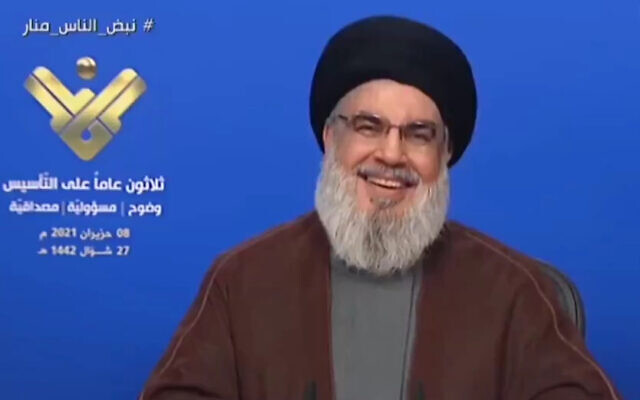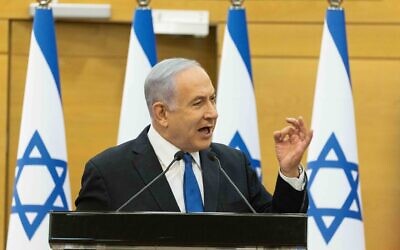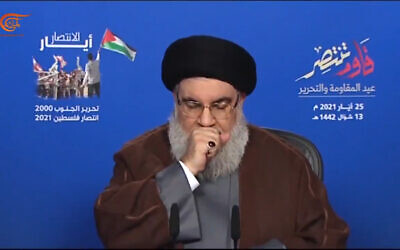Hezbollah chief says he hopes to pray at Al-Aqsa with supporters, warns ‘crisis-ridden’ Israel could ‘commit a foolish act’

In a Tuesday speech, Hezbollah chief Hassan Nasrallah pushed back against claims his health is deteriorating, saying that he is well, and adding that he hopes to soon pray at the Al-Aqsa Mosque in Jerusalem.
“I’m sorry to disappoint those who searched for my successor,” Nasrallah said while laughing. “I am alive and well, and I still dream of, and I have hope that we will perform prayers together in the holy Al-Aqsa Mosque,” he told supporters.
Nasrallah thanked those who were concerned with his health after sources close to the terror leader told Lebanese media last week that he was suffering from pneumonia and seasonal allergies, not COVID as had been rumored.
Those reports came after Nasrallah coughed and wheezed his way through a televised address in which he threatened “regional war” if Israel attacked holy sites in Jerusalem. The speech came a few days after a ceasefire ended 11 days of fighting between Hamas and Israel, with Nasrallah warning his terror group could get involved in the next round.
On Tuesday the Hezbollah leader briefly mentioned the Israeli political situation, saying that incumbent Prime Minister Benyamin Netanyahu and former US president Donald Trump copy from each other, after Netanyahu dubbed the recent coalition agreement that seeks to oust him as a “fraud.”
“Netanyahu has nowhere to go, he threatened regarding the [Iranian] nuclear situation and might commit a foolish act in the Palestinian arena, which poses a threat to the entire Islamic community,” Nasrallah said.
“What is happening in Jerusalem and in the Al-Aqsa Mosque complex obliges the entire Arab and Islamic nation to follow and take an interest, since we are confronting a stupid and crisis-ridden enemy that might commit a foolish act to escape [its crises],” the terror leader said.
In a report by Lebanon’s Al Joumhouria newspaper last week, sources close to Nasrallah said he was under the supervision of a specialist doctor but did not need hospital treatment. The doctor conducted consultations with other medical professionals, including one in the United States, who all came to the consensus that the terror leader was suffering from seasonal allergies and pneumonia.
Unnamed Israeli army officials had told Israeli media the military believed Nasrallah had contracted the coronavirus, which appeared to be largely based on circumstantial evidence, as according to Israel’s Channel 13 he was not thought to have been tested for COVID-19.

It is unknown if Nasrallah has been vaccinated against the virus.
Israeli military officials had derided the “coughing” speech by Nasrallah, who appeared pale and weak on camera.
Hezbollah’s shadow loomed large over Israel and Hamas’s conflict last month, with the possibility it could unleash its arsenal of missiles — far more powerful than Hamas’s — in support of the Palestinians. But the Iran-backed group largely remained on the sidelines.
Though Hezbollah did not play an active part in the fighting, three barrages of rockets were fired toward Israel from southern Lebanon during the Gaza battle. The rockets were apparently launched by Palestinian groups, but Israel believes Hezbollah at least tacitly approved them.
Daily protests, including by members of Hezbollah and Palestinians in Lebanon, took place along the frontier with Israel in solidarity with Gaza. One Hezbollah member was killed when Israel opened fire to push back against protesters who tried to break through the volatile border.
As reported by The Times of Israel
